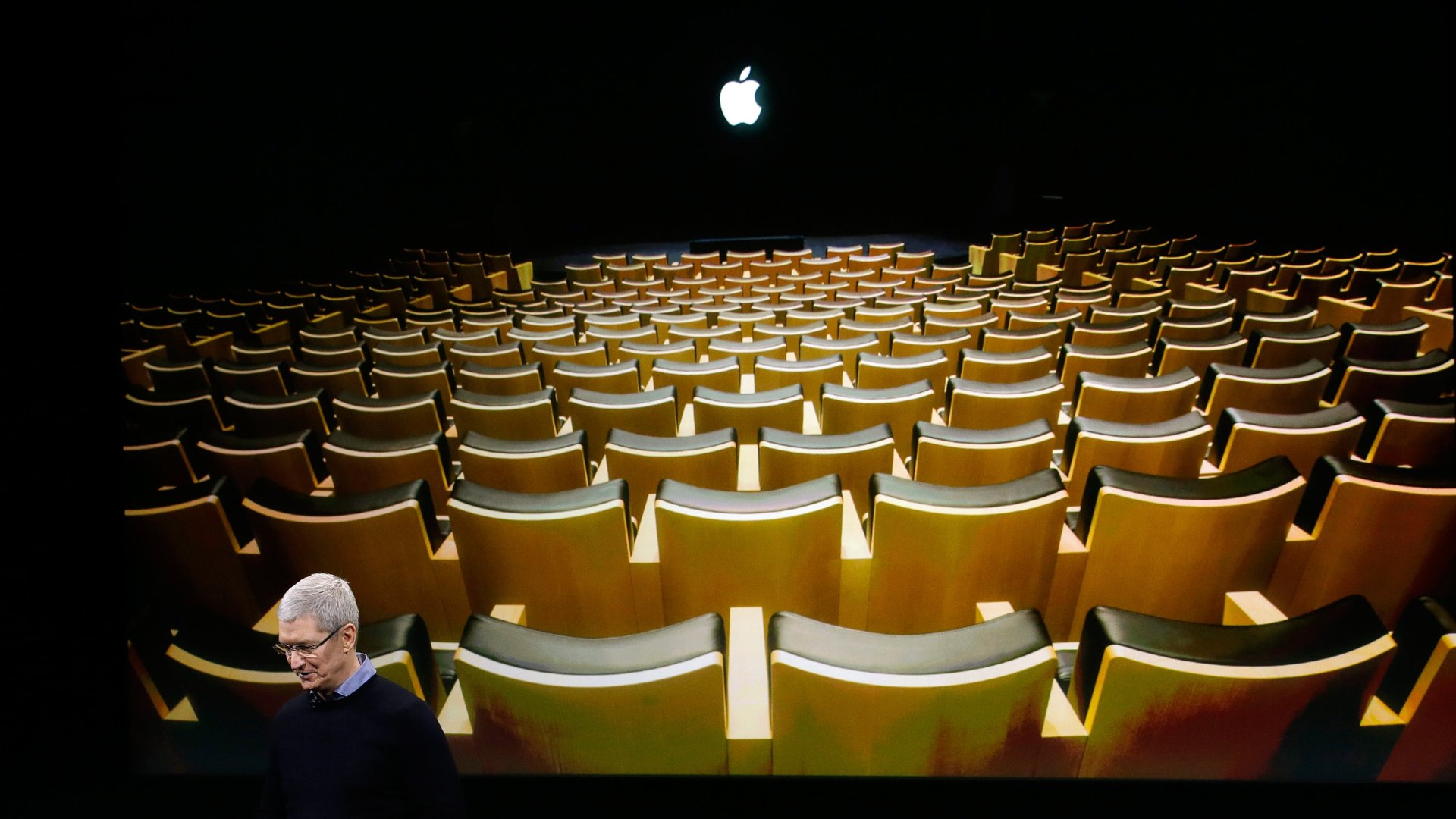Apple is boring now
At a lightning-fast press event yesterday (March 21), Apple announced a spate of product updates. A year ago, it unveiled the new MacBook laptop and told us when the Apple Watch—its first entirely new product in five years—would be available. At yesterday’s event, Apple’s big reveal was a smaller iPhone and iPad.


At a lightning-fast press event yesterday (March 21), Apple announced a spate of product updates. A year ago, it unveiled the new MacBook laptop and told us when the Apple Watch—its first entirely new product in five years—would be available. At yesterday’s event, Apple’s big reveal was a smaller iPhone and iPad.
Apple has in a few short years gone from a company with a sharp product focus to one that will seemingly produce any device in any size or color. In a recent question-and-answer session on Reddit, Apple co-founder Steve Wozniak worried that Apple is following the market, rather than leading it:
I worry a little bit about – I mean I love my Apple Watch, but – it’s taken us into a jewelry market where you’re going to buy a watch between $500 or $1100 based on how important you think you are as a person. The only difference is the band in all those watches. Twenty watches from $500 to $1100. The band’s the only difference? Well this isn’t the company that Apple was originally, or the company that really changed the world a lot. So it might be moving, but you’ve got to follow, you know. You’ve got to follow the paths of where the markets are.
Apple now sells 55 different Apple Watch bands and watches made out of five different materials, in two sizes. (That’s not to mention the myriad Hermès and Edition versions it also sells.) Apple sells iPads in five sizes and three colors, and has five iPhones in three sizes and four colors. It has laptops with 11, 12, 13 and 15-inch screens, some of which are available in multiple colors.
Apple used to make one great phone, and a few great laptops and iPods. While there was some variation among those products, we could count on Apple to announce some Big New Thing at a slick press event every year in California. Now Apple’s innovations are just Apple products in every size and shape you can think of. While it may make good business sense to make a variety of versions for a variety of people, it’s not like these things have gotten cheaper or more accessible. Samsung reportedly makes 26 different tablets, each with different screen sizes to capture just about everyone who might possibly want a tablet. Is Apple, the world’s most profitable company, now chasing the business model of Samsung?
The (potentially apocryphal) quote from Henry Ford sums up where Apple seems to be heading: “If I had asked people what they wanted, they would have said faster horses.” Apple products are still generally high quality—although some would argue the quality of its software is falling—and they still sell well, but there’s less that differentiates them from their competition. What do Apple products now offer that Samsung’s don’t?
Last month, Samsung announced its latest flagship smartphones, and tech journalists generally agreed that Samsung’s Galaxy S7 Edge phone is the best Android phone on the market. Some say it’s simply the best phone. Its camera is the best phone camera I’ve ever used. Other than the some annoying additional bloatware that Samsung and mobile carriers installed on the device, the phone itself is as satisfying as an iPhone 6S.
Apple just isn’t offering much to differentiate itself. New releases are just updates of past models, or the same device, but a bit thinner or nimbler. It launched the iPad Pro because it saw the Microsoft Surface; it launched the iPhone 6 Plus because it saw the Samsung Galaxy Note phablets; it launched the Apple Watch because it saw Android Wear and Fitbit and Jawbone. Apple used to be able to convince people they needed something they hadn’t even imagined, whether that was 1,000 songs in their pocket, or a talking watch. This year or next, Apple will almost certainly announce the following:
- The iPhone 7
- The Apple Watch 2
- The MacBook 2
- The iPad Pro 2
- A new iMac
- A new Mac Mini
- A new Apple TV
Like Disney’s Marvel Studios, Apple is now seemingly locked in an unending cycle of sequels and spin-offs. Even Apple’s next headquarters, Campus 2, is a sequel. Apple’s top brass spent the better part of an hour yesterday telling us that the weirdly old iPhone SE is the “best 4-inch phone” on the market and that we’ll love a smaller iPad Pro with a stylus that sticks out sideways from the tablet to charge.
Perhaps Tim Cook is satisfied with becoming this decade’s Microsoft, plugging along with updates and minor enhancements. Apple is making more and more money off of its services business—which includes iTunes, Apple Pay, AppleCare—and perhaps its customers will continue to generate revenue for the company as they stay locked in Apple’s ecosystem.
But will Apple create the next seismic shift technology, as it did with the iPhone and the iPod, or will it play catch-up? There have been rumblings of virtual reality devices, and Apple-made cars on the horizon, but considering Apple won’t be the first to enter either of those markets, those won’t necessarily be revolutionary devices.
Cook said at yesterday that Apple now has 1 billion active users of its products, and some are suggesting that as the company turns 40, it’s entering middle age. If Apple can keep making decent products that sell, perhaps being a boring middle-aged company will suit it just fine.
It’s just not what we might have expected from the Apple that Steve Jobs left in Tim Cook’s hands.